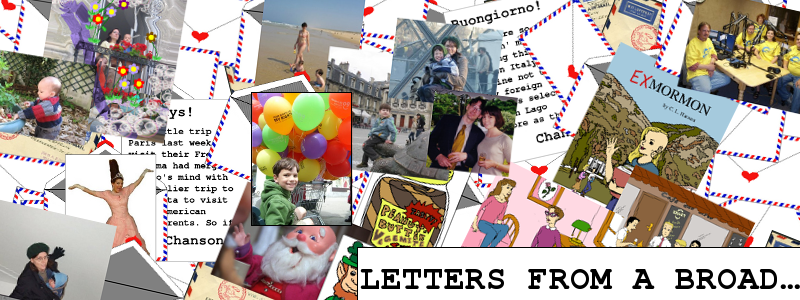How times change! It wasn't long ago that flying across the Atlantic with my two toddlers was a
horrific experience. Now that they're not toddlers anymore, my kids can entertain themselves so well that I can read a whole book during my flight!! During
last year's trip to the US, my husband bought
In the Land of Invented Languages
, but he left it there at my parents' house. It was clearly the perfect choice for my flight home to Switzerland this year.


What comes to mind when you think of invented languages? Esperanto? Klingon? Well, it turns out that those two have a special distinction: They are probably the only two wholly-invented languages that have live speakers who can carry on a real conversation in them. Esperanto even has a handful of
native speakers -- people who were brought up with Esperanto as a first language!! It's an astonishing feat, considering how many hundreds of languages have been invented, published, and forgotten. Heck, my brother and I invented one ourselves when we were kids. I also tried my hand at translating a few sentences into Klingon and Esperanto when I was in High School.
Arika Okrent tells a fascinating story about how people's ideas about language changed through the ages, and how that evolution, in turn, changed the types of languages that various mad dreamers invented. She also tells the story of how Esperanto achieved (relative) success, despite being arguably inferior to some of its close competitors. Essentially, the inventor of Esperanto wrote an amusing chain letter illustrating how easy (and fun!) it is to understand Esperanto if you already know one of the languages of western Europe. Then, once it has even a handful of speakers, it becomes the obvious choice if you want to learn an invented language. (That's why I tried it out in High School. Then I showed one of my translations to my mom, and -- instead of being impressed! -- she made fun of the fact that some perfectly ordinary verb translates, in Esperanto, as "penis." I kinda stopped bothering with it after that.)
One of the problems with Esperanto, as Okrent explains, is that it was created with an idealistic (yet not currently realistic) purpose. You want a language that has a relatively simple grammar, that is kind of halfway between the romance languages and the Germanic languages, and that people from all different countries can use to communicate with each other? Well, you've got it. It's called
English. Esperanto has some theoretical advantages over English, but if you think it's a serious competitor against English's billion-or-so speakers and thousand-year literary tradition, then you come off as, well, a little batty.
But Okrent explains a different (and arguably reasonable) motivation for learning Esperanto: Over the years, the Esperanto community has developed its own culture -- one which sounds fascinating and fun! If you're thinking of backpacking across Europe (or some other continent), the Esperantists have a whole network of folks who are willing to host you wherever you go (on the condition that you speak to them in Esperanto). And their conferences sound way more fun than a Renaissance Festival or a Star Trek or other geek conference. For a short while, Okrent had me totally tempted to pick up some Esperanto books and try again to learn it. That is, until I remembered that I have only so much time and so many brain-cells to devote to foreign languages, and I really, really, really need to learn
German.
Klingon, by contrast, skips the crazy idealism and goes straight for what works: fun!!! They've got a whole ridiculously silly (invented) culture and history to go with the invented language, which makes it a great (geeky) idle pastime. Naturally, the Klingon speakers do wildly frivolous things with the language like writing
operas and
translating the Book of Mormon into Klingon. Esperantists, being slightly more practical, have regular songs, and -- while there may or may not be an Esperanto translation of the BoM -- you can at least read the
Book of Mormon's
Wikipedia page in Esperanto (not true of Klingon!).
Okrent covers a whole bunch of other fascinating invented languages, and compares them with similar language innovations like symbolic languages that are used to introduce language to handicapped kids and like the revival of (once dead) Hebrew. But I don't want to give everything away, so I'll let you read the book for those! If anything I've said here intrigues you, you'll love this book. It's clear, entertaining, and informative.







